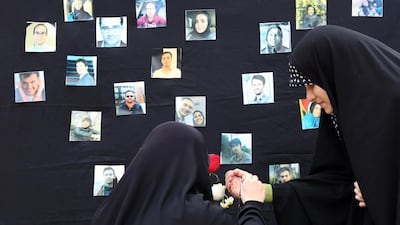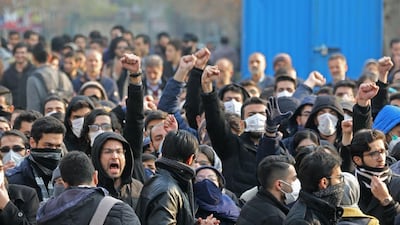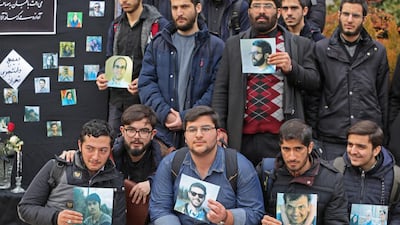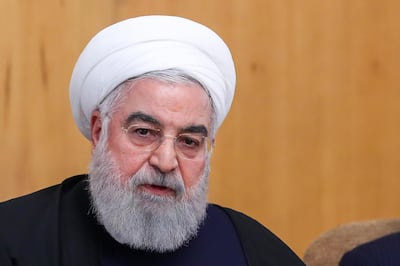Iran’s President Hassan Rouhani has dismissed plans for a new “Trump deal” to end Tehran’s ambitions for a nuclear weapon as he warned that US forces were in danger if they remained in the region.
In a televised speech, Mr Rouhani called for a return to the 2015 nuclear deal, describing the offer of a new agreement as “strange”. He said that President Donald Trump could not be trusted to keep his promises.
His comments came as the US Treasury Secretary Steven Mnuchin kept up the economic pressure and predicted that UN sanctions would "snap back into place” after European countries accused Iran of reneging on the commitments in the 2015 deal.
Boris Johnson, the UK prime minister, raised the prospect for a new deal overseen by Donald Trump on Tuesday, a suggestion heartily endorsed by the US president who wants to curtail Iran’s nuclear and missile programme and rein in its regional proxies.
“This Mr Prime Minister in London, I don’t know how he thinks. He says let’s put aside the nuclear deal and put the Trump plan in action," said Mr Rouhani.
“If you take the wrong step, it will be to your detriment. Pick the right path. The right path is to return to the nuclear deal."
He repeated Iran's longstanding position that peace can come to the Middle East only when the United States withdraws from the region.
"Today, the American soldier is in danger, tomorrow the European soldier could be in danger,” Mr Rouhani said.
“We want you to go from here, but not with war. We want you to leave the region intelligently and it’s to your benefit.”
He also criticised European powers for failing to fulfil their commitments while publicly backing the 2015 nuclear deal that was abandoned by Washington in 2018.
Britain, France and Germany have sought to retain a united front but on Tuesday triggered a dispute mechanism which could result in full sanctions being re-imposed on Iran.
Iran called the move a “strategic mistake” while Foreign Minister Javad Zarif insisted that the 2015 nuclear deal was “not dead” at a meeting in New Delhi.
Since May 2019, Iran has progressively breached the conditions of the deal in an apparent effort to force the EU’s hand and deliver economic benefits envisaged under the deal struck by Barack Obama.
Mr Rouhani said that Iran could reverse those steps as soon as sanctions were lifted. The US, which has embarked on a programme of “maximum pressure” against Iran that has crippled its economy has promised to continue the project until Tehran is prepared to negotiate.
Iran’s leadership has repeatedly refused to discuss a new deal while sanctions are in place.
The comments by Mr Johnson about a Trump deal appeared to undermine the carefully calibrated joint response by three European countries at the weekend aimed at backing the 2015 deal.
A senior former official who quit the Trump administration this month urged Mr Johnson on Wednesday to realign with the US position on Iran with a tough new sanctions regime. He said a new deal would not allow China and Russia to sell conventional weaponry to the administration in October.
Richard Goldberg, whose Iran-focused role saw him play a key role in the maximum pressure campaign, linked agreement with Donald Trump’s Iran policy with future discussions on a trade deal when the UK leaves the European Union on January 31.
“What are you going to do post January 31 as you come to Washington to negotiate a free trade agreement with the United States?” he told the BBC.
“It’s absolutely in his interests…. to realign your policy away from Brussels and join the maximum pressure campaign to keep all of us safe.”
Mr Rouhani’s comments come in the aftermath of the killing of General Qassem Suleimani, one of Iran’s top leaders, in a drone strike on January 3.
Tehran responded a week later by launching missiles at US targets, but the strikes exposed the military weakness of Tehran, said analysts. Nobody was killed in the retaliatory strikes.
The mistaken shooting down of a Ukrainian jet liner killing everyone on board hours later compounded the sense of crisis within the Iranian leadership, which is also facing street protests questioning its legitimacy to rule.













